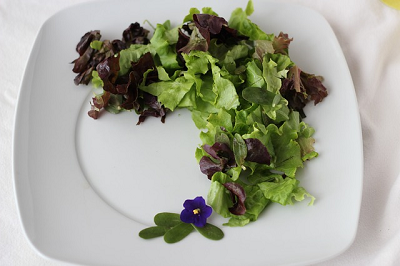Who Knew? Purslane Can Treat Gynecological Inflammations
Purslane is a common herb in daily life. Many people know it as a type of wild vegetable with a crisp and tender texture, slightly sour taste, and appetizing properties.

However, purslane is not just a vegetable; it also holds significant medicinal value. As a Traditional Chinese Medicinal herb, purslane possesses various therapeutic effects, including clearing heat and detoxification, diuresis, cooling blood and stopping bleeding, antibacterial and anti-inflammatory properties, and promoting intestinal moisture and bowel movements.
Purslane can be used to treat symptoms of heat-toxin conditions such as sore throat and oral ulcers. Additionally, it promotes urine excretion, reduces edema, and helps alleviate urinary difficulties or urinary retention.
Moreover, purslane's ability to cool blood and stop bleeding makes it effective in treating symptoms such as bloody pus, hematuria, and abnormal vaginal discharge. Being hailed as a natural antibiotic, purslane strongly inhibits various bacteria, including Shigella, Escherichia coli, and Staphylococcus aureus. Furthermore, being rich in dietary fiber, purslane can moisturize the intestines and promote bowel movements, thus improving symptoms of constipation.
In some dietary therapies, purslane is even used to treat gynecological inflammations. So, can purslane truly treat gynecological diseases? What specific gynecological inflammations can it address?
Can Purslane Really Treat Gynecological Diseases?
Purslane is believed to have anti-inflammatory, antibacterial, diuretic, and anti-edema effects. It has a specific therapeutic effect on Escherichia coli and Salmonella typhi, and consuming purslane can help kill these bacteria effectively, thereby treating colds and inflammation.
Regarding the treatment of gynecological diseases, purslane does have some efficacy. It can serve as an adjunctive treatment for some common gynecological inflammations. Especially for women postpartum, if they experience symptoms such as spontaneous sweating, dysmenorrhea, and abdominal pain, taking purslane can have an excellent relieving effect.
However, there are many types of gynecological diseases, and not all patients with gynecological diseases are suitable for consuming purslane excessively. In addition to taking purslane based on individual circumstances, it is best to consult a doctor for advice. Following the doctor's advice will lead to better treatment outcomes.
What gynecological diseases can purslane treat?
1. Vaginitis:
Bacterial vaginosis is mainly caused by bacterial infection in the vagina, often aerobic bacteria, leading to an imbalance in the normal vaginal flora. Symptoms include increased vaginal discharge, which is thin and grayish-white and may have a fishy odor. The anti-bacterial components in purslane can help inhibit bacterial growth and relieve symptoms, effectively alleviating bacterial vaginosis.
Trichomonas vaginitis is a disease caused by trichomonas infection, characterized by increased, thin, foul-smelling vaginal discharge or frothy, yellow-green discharge. The metronidazole component in purslane can inhibit the growth of trichomonas and help alleviate symptoms.
2. Cervicitis:
This disease is caused mainly by pathogen infections in the cervix, manifesting as an increased, viscous vaginal discharge that is gray, pale yellow, or purulent, sometimes with an unpleasant odor. The metronidazole component in purslane can inhibit or kill bacteria, helping to alleviate symptoms of cervicitis.
3. Pelvic Inflammatory Disease (PID):
PID typically refers to inflammation of the female upper genital tract and surrounding tissues, including salpingitis, tubo-ovarian abscess, endometritis, and pelvic peritonitis. Typical symptoms include persistent lower abdominal pain, increased vaginal discharge, and pain during intercourse. Purslane can clear internal heat toxins, promote toxin excretion, reduce swelling and pain, and has anti-inflammatory and anti-bacterial effects, improving symptoms of PID.
While purslane has specific medicinal value, its efficacy in treating gynecological inflammatory diseases mentioned above is limited. For better treatment of pelvic inflammatory disease, cervicitis, vaginitis, and other related conditions, choosing the patented Chinese medicine Fuyan Pill can yield superior results.
The Pill possesses potent antibacterial properties, effectively eliminating infections in the female reproductive system. It also promotes blood circulation, resolves stasis, invigorates the spleen, and eliminates dampness, improving symptoms such as swelling, pain, abnormal vaginal discharge, and irregular menstruation caused by gynecological inflammation, thus restoring women's reproductive health.
You may also be interested in:
Pregnancy Preparation: These Gynecological Diseases May Cause Infertility
Gynecological Diseases May Entangle You With Three Bad Habits
Summer Has a High Rate of Gynecological Diseases, Be Alert to Four Diseases
Perform Hysterosalpingogram if You Can't Get Pregnant? Doctor: Not Recommended in These 4 Cases!
previous pageBridging the Cervical Screening Knowledge Gap to Safeguard Women's Health
next pageTestimonials
- Adenomyosis with Ureaplasma Urealyticum Cured by Fuyan Pill
- Tubal blockage with hydrosalpinx can be cured by TCM shortly
- Fuyan Pill Helps A woman with Adenomyosis Get Pregnant
- A Woman with Hydrosalpinx Is Cured with Fuyan pill
- Pelvic Inflammatory Disease Testimonials
- Irregular Vaginal Bleeding and Endometrial Thickening Cured by Fuyan Pill
- Pruritus Vulvae and Frequent Urination: Mycoplasma Infection Cured after 2 Courses



